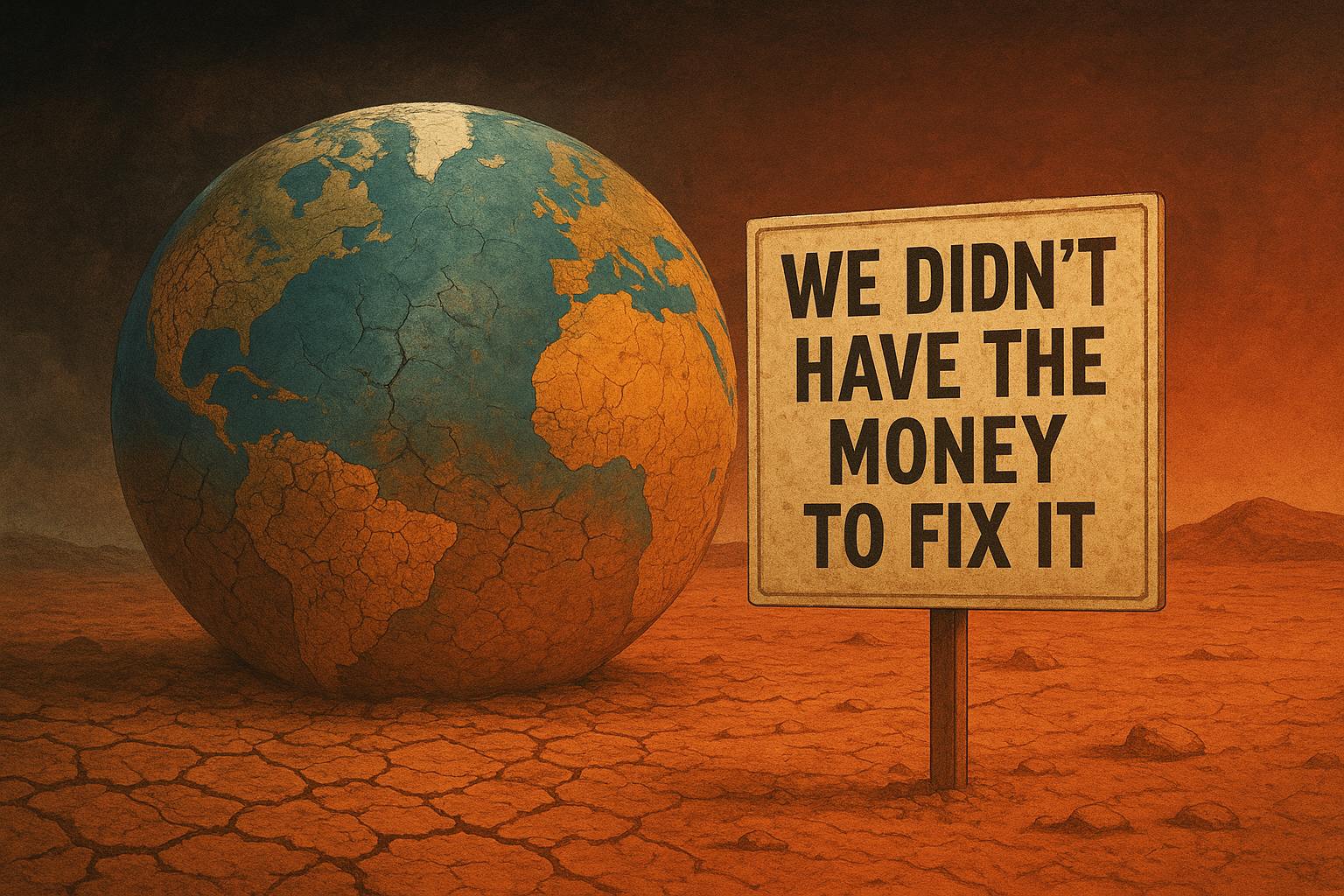Modern economy funds what returns capital. That’s efficient for many things—until the necessary work is unprofitable. Cleaning our air, water, and soil is a prime example: pollution has been a by-product of profitable activity; cleaning it is usually a cost center. We now face a paradox: problems we must solve to survive don’t generate the “value” our system recognizes.
What “Cleaning the Planet” Really Means
- Earth cleaning is the reverse of polluting: removing particles and trash accumulated over decades in air, waters, and soil, and it should be, in all logic, the #1 industry in the future
- It’s not optional. If regulators are struggling to reduce emissions fast enough, we must also accelerate cleaning to offset damage already done.
- It’s expensive, slow to monetize, and hard to collateralize. That’s why it struggles to attract capital at the scale and speed required.
What We’ve Tried (and Why It’s Not Enough)
- Carbon taxes and credits can help, but global alignment is unlikely in time, and taxes don’t automatically turn problems into solutions.
- Philanthropy and mindful companies do important work, but their budgets and mandates are limited.
- “Make cleaning profitable” is more slogan than plan. Some business models exist (e.g., CO2 capture with resale, ocean plastics upcycling), but many cleaning tasks have no market buyer.
The ROI(Return On Investment) Constraint
Capital markets optimize for return. Governments also rely on tax revenues and debt markets—both ultimately sensitive to growth forecasts and interest costs. When a vital activity has a weak or negative ROI, it loses in budget prioritization against activities that promise growth. That logic is coherent internally—but existentially misaligned with planetary needs.
Examples of Non-ROI Vital Work
- Industrial-scale particulate removal from air over megacities.
- River, ocean, and microplastic cleanup at the source and at scale.
- Soil remediation for heavy metals and chemical runoff.
- Global reforestation where land-use economics are unfavorable.
- Reshoring/nearshoring essential industries to reduce freight emissions where no clean immediate substitute exists for heavy transportation.
Why the Current Monetary System Struggles
- It rations funding through profitability filters and risk premiums.
- It treats many forms of cleaning as “costs,” not “assets” that generate cashflows.
- It requires political coordination for public-good spending that is slow and polarizing across borders.
- Currency competitiveness—each jurisdiction having its own cost of capital and trade—discourages unilateral spending on non-ROI global goods.
What a Fix Would Require (Design Principles)
- Abundant, stable funding for activities with low or negative ROI but high social impact.
- Programmatic transparency so the public and regulators can verify how funds are used and what impact they produce.
- Global interoperability so cleaning projects can be financed where they are most effective, not just where capital is cheapest.
- Governance that can prioritize public goods without hinging on short-term profit cycles.
A Proposal to Consider: Financing Non-ROI Essentials with Programmable Money
The O project proposes a monetary instrument designed to fill this gap.
Conceptually:
- Unlimited yet stable medium: elastic issuance to match need, with stability rules independent of human confidence cycles. Funding subject to performance and deliveries.
- No creditor overhang: fund public-good tasks without debt-service constraints that crowd out operations.
- Programmatic guardrails: real-time attestations, proof-of-liabilities, open dashboards, and policy hooks for regulators.
- Target use case: finance earth cleaning—air, water, and soil—at scales capital markets won’t touch due to weak ROI, plus strategic relocation of industries closer to customers to cut freight emissions.
Why are we touting unlimited supply and stability together?
Unlimited without stability is inflationary chaos. Stability without elasticity starves essential work. The premise is to maintain price stability through transparent, rule-based mechanisms while allowing supply to expand specifically into audited, non-ROI vital activities. Think stable purchasing power plus issuance tied to verifiable public-good outputs (e.g., tons of CO2 captured, hectares of soil remediated, kilometers of river cleaned).
Safeguards You’d Expect
- Transparent governance with multi-party controls.
- Redundant oracles and continuous audits.
- Public impact metrics per funded project and performance monitoring.
- Clear on/off policy levers so supervisors can intervene if metrics drift or abuse occurs.
What This Enables
- Large-scale cleaning programs that don’t rely on fragile business models.
- Faster deployment where the marginal benefit is highest, irrespective of local tax capacity.
- A way to fund shared survival tasks even when traditional ROI is absent.
What to Do Today
- Support and scale existing cleaning tech: CO2 capture, ocean cleanup, soil remediation.
- Back nonprofits already doing the hard work on rivers, oceans, air, and soil.
- Encourage industry relocation closer to customers where feasible to reduce high-emission freight.
- Push for radical transparency: real-time reporting on environmental spending and outcomes. Public Transparency.
- Support our non-profit, O International, for the creation of a stable digital currency ecosystem based on global water prices. https://o.international
We don’t lack ideas or tools to clean up; we lack a monetary logic that funds non-ROI necessities at a planetary scale. If we keep asking capital markets to solve problems that don’t return capital, we will keep getting underinvestment. The path forward is to redefine what we’re willing—and able—to finance, with mechanisms built for public goods rather than profits alone.
Note: This is a design space; O coin is one proposed approach—not investment advice.
Learn more on how a stable coin based on global water price can resolve all those issues very quickly at https://o.international


